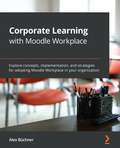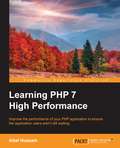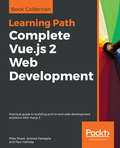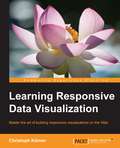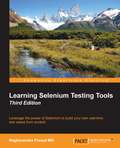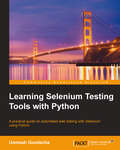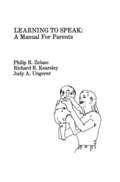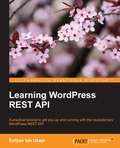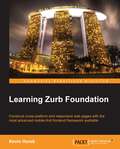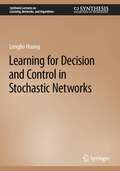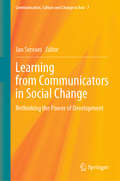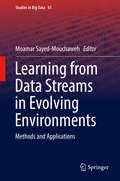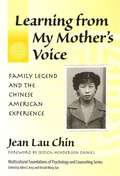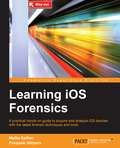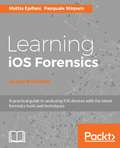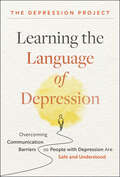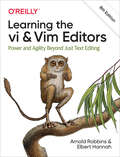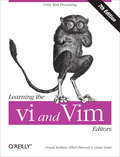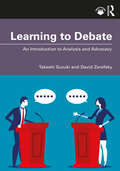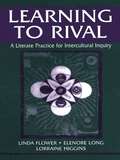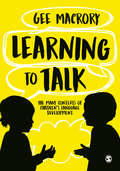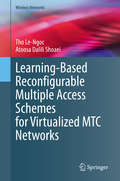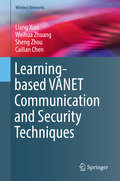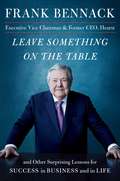- Table View
- List View
Learning Moodle Workplace
by Alex BüchnerThis book is for workplace administrators in technical, organizational as well as pedagogical capacity. Managers who lead teams in the workplace, especially HR, will also find it useful. Learners who use Workplace for their continuous professional development will also benefit from the book. Prior exposure to the Moodle platform will help you follow the book easily.
Learning PHP 7 High Performance
by Altaf HussainImprove the performance of your PHP application to ensure the application users aren't left waiting About This Book * Make the optimum use of PHP coding to improve your programming productivity * Leverage the potential of PHP for server-side programming, memory management, and object-oriented programming * Packed with real-life examples to help the readers implement concepts as they learn Who This Book Is For This book is for those who have basic experience in PHP programming. If you are developing performance-critical applications, then this book is for you. What You Will Learn * Setup high performance development and production environment for PHP 7 * Discover new OOP features in PHP 7 to achieve high performance * Improve your PHP applications' performance * Attain improved database performance * Benchmark PHP applications to optimize them * Write quality code by learning to improve code reusability, simplicity, and expressiveness * Get rid of the bottlenecks in your PHP 7 applications by writing PHP code optimally * Tackle issues related to web applications, such as high user dependency and large datasets In Detail PHP is a great language for building web applications. It is essentially a server-side scripting language that is also used for general-purpose programming. PHP 7 is the latest version, providing major backward-compatibility breaks and focusing on high performance and speed. This fast-paced introduction to PHP 7 will improve your productivity and coding skills. The concepts covered will allow you, as a PHP programmer, to improve the performance standards of your applications. We will introduce you to the new features in PHP 7 and then will run through the concepts of object-oriented programming (OOP) in PHP 7. Next, we will shed some light on how to improve your PHP 7 applications' performance and database performance. Through this book, you will be able to improve the performance of your programs using the various benchmarking tools discussed. At the end, the book discusses some best practices in PHP programming to help you improve the quality of your code. Style and approach The book is a step-by-step guide to improve the quality of your code in PHP through real-time examples. The book takes a practical approach to improving the quality of your code.
Learning Path - Complete Vue.js 2 Web Development: Practical Guide To Building End-to-end Web Development Solutions With Vue. Js 2
by Andrea Passaglia Mike Street Paul HallidayThe Learning Path is intended for JavaScript developers at any level of expertise who wants to learn Vue.js and develop productive web applications with the power of the latest Vue.js.
Learning Responsive Data Visualization
by Christoph KornerMaster the art of building responsive visualizations on the Web About This Book * Learn the techniques for building data visualizations that work well for all screen sizes * Implement responsive techniques with popular libraries to get to grips with building responsive visualizations that work in the real world * Incorporate responsive workflow in your data visualization process to build visualizations that take a mobile-first approach. Who This Book Is For Web developers and data science professionals who want to make their visualizations work for smaller screen sizes. Some basic knowledge of JavaScript and Data visualization is expected. What You Will Learn * Get familiar with responsive design for data visualizations * Understand the main concepts of D3.js to create interactive visualizations * Unleash the power of Bootstrap to create stunning and responsive visualizations for all screen resolutions * Implement Touch and Mouse interactions for mobile-first applications * Design Transitions and Animations that impress in portrait and landscape * Build a Responsive World Map using GeoJSON and D3.js In Detail Using D3.js and Responsive Design principles, you will not just be able to implement visualizations that look and feel awesome across all devices and screen resolutions, but you will also boost your productivity and reduce development time by making use of Bootstrap--the most popular framework for developing responsive web applications. This book teaches the basics of scalable vector graphics (SVG), D3.js, and Bootstrap while focusing on Responsive Design as well as mobile-first visualizations; the reader will start by discovering Bootstrap and how it can be used for creating responsive applications, and then implement a basic bar chart in D3.js. You will learn about loading, parsing, and filtering data in JavaScript and then dive into creating a responsive visualization by using Media Queries, responsive interactions for Mobile and Desktop devices, and transitions to bring the visualization to life. In the following chapters, we build a fully responsive interactive map to display geographic data using GeoJSON and set up integration testing with Protractor to test the application across real devices using a mobile API gateway such as AWS Device Farm. You will finish the journey by discovering the caveats of mobile-first applications and learn how to master cross-browser complications. Style and approach As the world shifts to mobile devices for consuming data on the Web, developers are faced with the unique challenge of making data visualizations work for their smaller screens. The growth of responsive web design enabled developers to adopt page layouts and media for smaller screens, but there is still little information available on how to adapt data visualizations for the smaller screens. This book fills this important gap and shows how responsive web design principles can be extended to create visualizations that work well regardless of the screen size, thereby allowing developers to build user-friendly visualizations that work well on all devices. In addition to covering some of the popular techniques and design patterns for building responsive visualizations, the book also shows readers how to implement these techniques with the help of some popular tools and libraries.
Learning Selenium Testing Tools - Third Edition
by Raghavendra Prasad MgIf you are a software developer with a basic knowledge of testing and are interested in automated testing using Selenium, this is the book for you. No prior knowledge of Selenium is required.
Learning Selenium Testing Tools with Python
by Unmesh GundechaIf you are a quality testing professional, or a software or web application developer looking to create automation test scripts for your web applications, with an interest in Python, then this is the perfect guide for you. Python developers who need to do Selenium testing need not learn Java, as they can directly use Selenium for testing with this book.
Learning To Speak: A Manual for Parents
by P. R. Zelazo R. B. Kearsley J. A. UngererFirst published in 1984. Routledge is an imprint of Taylor & Francis, an informa company.
Learning WordPress REST API
by Sufyan Bin UzayrA practical tutorial to get you up and running with the revolutionary WordPress REST API About This Book * Learn how to run the latest WordPress REST API with various platforms * Create exciting apps and manage non-WordPress content with them * Secure, export, and manage your data through illustrative examples Who This Book Is For This book is for WordPress developers and designers who want to get a complete practical understanding of the WordPress REST API and leverage it to create fully-featured web apps. What You Will Learn * Use the WordPress REST API to read, write, and edit posts * Create and work with metadata using the WordPress REST API * Work with taxonomies using the REST API * Add custom routes and build apps using the WordPress REST API * Process requests and integrate with external applications and frameworks * Make your WordPress projects ready for the RESTful API standard In Detail The WordPress REST API is a recent innovation that has the potential to unlock several new opportunities for WordPress developers. It can help you integrate with technologies outside of WordPress, as well as offer great flexibility when developing themes and plugins for WordPress. As such, the REST API can make developers' lives easier. The book begins by covering the basics of the REST API and how it can be used along with WordPress. Learn how the REST API interacts with WordPress, allowing you to copy posts and modify post metadata. Move on to get an understanding of taxonomies and user roles are in WordPress and how to use them with the WordPress REST API. Next, find out how to edit and process forms with AJAX and how to create custom routes and functions. You will create a fully-functional single page web app using a WordPress site and the REST API. Lastly, you will see how to deal with the REST API in future versions and will use it to interact it with third-party services. By the end of the book, you will be able to work with the WordPress REST API to build web applications. Style and Approach A step by step tutorial to explain the new and exciting world of the WordPress REST API with the real world examples.
Learning Zurb Foundation
by Kevin HorekIf you are a web designer, developer, or anyone who is interested in building responsive websites, then this book is a must-have. Basic knowledge of CSS, HTML, and JavaScript is required.
Learning for Decision and Control in Stochastic Networks (Synthesis Lectures on Learning, Networks, and Algorithms)
by Longbo HuangThis book introduces the Learning-Augmented Network Optimization (LANO) paradigm, which interconnects network optimization with the emerging AI theory and algorithms and has been receiving a growing attention in network research. The authors present the topic based on a general stochastic network optimization model, and review several important theoretical tools that are widely adopted in network research, including convex optimization, the drift method, and mean-field analysis. The book then covers several popular learning-based methods, i.e., learning-augmented drift, multi-armed bandit and reinforcement learning, along with applications in networks where the techniques have been successfully applied. The authors also provide a discussion on potential future directions and challenges.
Learning from Communicators in Social Change: Rethinking the Power of Development (Communication, Culture and Change in Asia #7)
by Jan ServaesThis book presents the perspectives of some of the main players, both academics and professionals, in communication for sustainable development and social change so as to provide valuable lessons for future generations of change agents. It places emphasis on both the theoretical foundation and practical applications and ethical concerns in communication for development and social change. Most of the available historical accounts in development communications make a distinction between the modernization paradigm, the dependency paradigm and the multiplicity or participatory paradigm. These historical accounts have been dominated by framing developments within these paradigms, as the logical offspring of the Western drive to develop the world after colonization and the Second World War. The subsequent collapse of the Soviet Union in the late eighties, together with the rise of the U.S. as the only remaining ‘superpower,’ the emergence of the European Union and China, the gradual coming to the fore of regional powers, such as the BRICS countries, and the recent meltdown of the world financial system has rendered disastrous consequences for people everywhere. This book responds to these changes and challenges in presenting a rethinking of the “power” of development, and consequently the place and role of communication in it. It is aimed at both emerging research students, policymakers and social research practitioners who are interested in the history of communication for development and social change and the role and place of mayor players in it. This is most applicable to the political and educational sector, as well as scholars of history, social work, and human rights. The book will provide valuable insights for beginners in these fields who are not yet familiar with the increasingly important and emerging field of global social change.
Learning from Data Streams in Evolving Environments: Methods And Applications (Studies in Big Data #41)
by Moamar Sayed-MouchawehThis edited book covers recent advances of techniques, methods and tools treating the problem of learning from data streams generated by evolving non-stationary processes. The goal is to discuss and overview the advanced techniques, methods and tools that are dedicated to manage, exploit and interpret data streams in non-stationary environments. The book includes the required notions, definitions, and background to understand the problem of learning from data streams in non-stationary environments and synthesizes the state-of-the-art in the domain, discussing advanced aspects and concepts and presenting open problems and future challenges in this field. Provides multiple examples to facilitate the understanding data streams in non-stationary environments;Presents several application cases to show how the methods solve different real world problems;Discusses the links between methods to help stimulate new research and application directions.
Learning from My Mother's Voice: Family Legend and the Chinese American Experience
by Jean Lau Chin"As the reader takes Jean Lau Chin's guided tours through myth and cultural history, it is clear that these stories are more than entertainment: They represent cultural messages about living as a woman. The juxtaposition of Chinese and Western myths with their similarities and differences, followed by the author's incisive analysis of contemporary stories depicting Asian women in print and on the screen, provide culturally driven connections to perceptions and behaviors of Chinese women both individually and in relation to the world. Through these stories, a rich tapestry of information about Chinese women and Chinese American women emerges. The stereotypical Chinese woman fails to appear as the various lenses of ethnicity, gender, location, and epoch make explicit the diversity that exists within any ethnic group and liberate us by providing an informed array of images and possibilities." From Book
Learning iOS Forensics
by Pasquale Stirparo Mattia EpifaniIf you are a digital forensics examiner daily involved in the acquisition and analysis of mobile devices and want to have a complete overview of how to perform your work on iOS devices, this book is definitely for you.
Learning iOS Forensics - Second Edition
by Pasquale Stirparo Mattia EpifaniA practical guide to analyzing iOS devices with the latest forensics tools and techniques About This Book * This book is a comprehensive update to Learning iOS Forensics * This practical book will not only cover the critical aspects of digital forensics, but also mobile forensics * Whether you're a forensic analyst or an iOS developer, there's something in this book for you * The authors, Mattia Epifani and Pasquale Stirparo, are respected members of the community, they go into extensive detail to cover critical topics Who This Book Is For The book is for digital forensics analysts, incident response analysts, IT security experts, and malware analysts. It would be beneficial if you have basic knowledge of forensics What You Will Learn * Identify an iOS device between various models (iPhone, iPad, iPod Touch) and verify the iOS version installed * Crack or bypass the protection passcode chosen by the user * Acquire, at the most detailed level, the content of an iOS Device (physical, advanced logical, or logical) * Recover information from a local backup and eventually crack the backup password * Download back-up information stored on iCloud * Analyze system, user, and third-party information from a device, a backup, or iCloud * Examine malicious apps to identify data and credential thefts In Detail Mobile forensics is used within many different domains, but is chiefly employed in the field of information security. By understanding common attack vectors and vulnerability points, security professionals can develop measures and examine system architectures to harden security on iOS devices. This book is a complete manual on the identification, acquisition, and analysis of iOS devices, updated to iOS 8 and 9. You will learn by doing, with various case studies. The book covers different devices, operating system, and apps. There is a completely renewed section on third-party apps with a detailed analysis of the most interesting artifacts. By investigating compromised devices, you can work out the identity of the attacker, as well as what was taken, when, why, where, and how the attack was conducted. Also you will learn in detail about data security and application security that can assist forensics investigators and application developers. It will take hands-on approach to solve complex problems of digital forensics as well as mobile forensics. Style and approach This book provides a step-by-step approach that will guide you through one topic at a time. This intuitive guide focuses on one key topic at a time. Building upon the acquired knowledge in each chapter, we will connect the fundamental theory and practical tips by illustrative visualizations and hands-on code examples.
Learning the Language of Depression: Overcoming Communication Barriers so People with Depression Are Safe and Understood
by The Depression ProjectIn order for people with depression to feel safe and understood, it's essential to overcome depression's "language barrier" As The Depression Project hears every single day from members of their 3,000,000+ person social media community, a “language barrier” often exists between people with depression and those around them — in the sense that many words, everyday expressions and non-verbal forms of communication can take on a vastly different meaning than they otherwise would when they are coming from someone who has depression. And, as The Depression Project also continuously hears, this “language barrier” can result in people with depression being judged and criticized; having conflict with their loved ones; feeling alone, misunderstood and unsupported; and being more at risk of attempting suicide. Consequently, in order to overcome this “language barrier” and therefore help people with depression feel safe, understood, supported and much better as a result. This book will: Explain what people with depression are actually going through when they say “I have depression” (it is much more than sadness); when they say “I'm fine” (very often they are not); when they say “I'm tired” (“depression tiredness” is very different from “normal tiredness”); when they say “I can't” (which is often misinterpreted as “I won't”, and as that person with depression just being “lazy”); and when they say other commonly spoken phrases that are often misunderstood by people who have never experienced depression themselves before. Share a wide variety of suggestions to help make it easier for people with depression to put what they are going through into words. Highlight the language people with depression often use that can indicate they are feeling suicidal (which tragically, is often ignored, dismissed or not picked up on by the people around them). Look at depression's “facial language barrier”, and explain what people with depression are often actually going through when they smile, avoid eye contact, have muted facial expressions, or look tired or frustrated (when a person has depression, these facial expressions and interactions can often mean something very, very different than they otherwise would). Address depression's “touch language barrier” by clarifying the reasons why depression can cause someone to be much less tactile and physically intimate than they would otherwise be, and by explaining the steps that can be taken to help prevent this lack of physical intimacy from spiraling into long-term relationship problems. Learning The Language Of Depression is an ideal book for people with depression who would like some help communicating what they are going through so that they can be better understood, as well as friends and family of someone with depression who would like to better understand their loved one and effectively support them.
Learning the vi and Vim Editors: Power and Agility Beyond Just Text Editing
by Arnold Robbins Elbert HannahAmong the text editors being used in the programming community, perhaps the most important family is vi and its derivatives. With this updated edition, Unix and Linux users will learn text editing basics for both vi and Vim ("vi improved") before moving on to advanced editing tools for each editor. Authors Arnold Robbins and Elbert Hannah cover the latest major releases of Vim, including 8.0 and 8.2.If you're a programmer or computer analyst, or you work with browsers or command-line interfaces, using Vim can speed up your work and make complex tasks easier. You'll examine multiwindow editing, global search and replacement, and power tools for programmers, and learn how to write interactive macros and scripts to extend the editor--all in the easy-to-follow style that's made this book a classic.Go beyond the basics to learn which vi commands fit your specific needsLearn advanced vi tools that shift most of the editing burden to the computerExplore Vim tools that provide major improvements over viExamine Vimâ??s multiwindow editing feature, a significant upgrade over viUse Vim scripts to customize and tailor Vim to your needsLook at Vim in modern GUI environments with Graphical Vim (gvim)See Vim in the broader programming milieu, including usingit as an IDE
Learning the vi and Vim Editors: Text Processing at Maximum Speed and Power
by Linda Lamb Arnold Robbins Elbert HannahThere's nothing that hard-core Unix and Linux users are more fanatical about than their text editor. Editors are the subject of adoration and worship, or of scorn and ridicule, depending upon whether the topic of discussion is your editor or someone else's. vi has been the standard editor for close to 30 years. Popular on Unix and Linux, it has a growing following on Windows systems, too. Most experienced system administrators cite vi as their tool of choice. And since 1986, this book has been the guide for vi. However, Unix systems are not what they were 30 years ago, and neither is this book. While retaining all the valuable features of previous editions, the 7th edition of Learning the vi and vim Editors has been expanded to include detailed information on vim, the leading vi clone. vim is the default version of vi on most Linux systems and on Mac OS X, and is available for many other operating systems too. With this guide, you learn text editing basics and advanced tools for both editors, such as multi-window editing, how to write both interactive macros and scripts to extend the editor, and power tools for programmers -- all in the easy-to-follow style that has made this book a classic.Learning the vi and vim Editors includes:A complete introduction to text editing with vi: How to move around vi in a hurry Beyond the basics, such as using buffers vi's global search and replacement Advanced editing, including customizing vi and executing Unix commandsHow to make full use of vim: Extended text objects and more powerful regular expressions Multi-window editing and powerful vim scripts How to make full use of the GUI version of vim, called gvim vim's enhancements for programmers, such as syntax highlighting, folding and extended tags Coverage of three other popular vi clones -- nvi, elvis, and vile -- is also included. You'll find several valuable appendixes, including an alphabetical quick reference to both vi and ex mode commands for regular vi and for vim, plus an updated appendix on vi and the Internet. Learning either vi or vim is required knowledge if you use Linux or Unix, and in either case, reading this book is essential. After reading this book, the choice of editor will be obvious for you too.
Learning to Debate: An Introduction to Analysis and Advocacy
by David Zarefsky Takeshi SuzukiWritten in an accessible style, this textbook introduces undergraduate students to the theoretical and practical aspects of debate and outlines the fundamental skills of analysis and advocacy.Debate teaches students how to solve the problems that we face in everyday and public situations. This book allows readers to face such problems head on by equipping them with the knowledge and skills to analyze a situation, propose solutions, and present debates and arguments in a persuasive manner. Organized into two parts, the book begins by laying the theoretical foundations and offering a step-by-step guide to debate. Students are shown how to compare pros and cons, test evidence and reasoning, and defend and develop their own positions. Each chapter in part two explores key sample constructive, rebuttal, and summary debate speeches and includes exercises and assignments to allow students to actively engage with the material and experience debate in the classroom.Providing students with the tools to become responsible members of a democratic society, Learning to Debate: An Introduction to Analysis and Advocacy is an ideal textbook for undergraduate Argumentation and Debate and Speech Communication courses.Material for instructors, including PowerPoint slides and an instructor’s manual, is available at https://routledge.com/9781032671390.
Learning to Rival: A Literate Practice for Intercultural Inquiry (Rhetoric, Knowledge, and Society Series)
by Linda Flower Elenore Long Lorraine HigginsLearning to Rival tells the inside story of college and high school writers learning to "rival"--to actively seek rival hypotheses and negotiate alternative perspectives on charged questions. It shows how this interdisciplinary literate practice alters with the context of use and how, in learning to rival in school and out, students must often negotiate conflicts not apparent to instructors. This study of the rival hypothesis stance--a powerful literate practice claimed by both humanities and science--initially posed two questions: * how does the rival hypothesis stance define itself as a literate practice as we move across the boundaries of disciplines and genres, of school and community? * how do learners crossing these boundaries interpret and use the family of literate practices, especially in situations that pose problems of intercultural understanding? Over the course of this project with urban teenagers and minority college students, the rival hypothesis stance emerged as a generative and powerful tool for intercultural inquiry, posing in turn a new question: how can the practice of rivaling support the difficult and essential art of intercultural interpretation in education? The authors present the story of a literate practice that moves across communities, as well as the stories of students who are learning to rival across the curriculum. Learning to Rival offers an active, strategic approach to multiculturalism, addressing how people negotiate and use difference to solve problems. In the spirit of John Dewey's experimental way of knowing, it presents a multifaceted approach to literacy research, combining contemporary research methods to show the complexity of rivaling as a literate practice and the way it is understood and used by a variety of writers. As a resource for scholars, teachers, and administrators in writing across the curriculum studies, writing program administration, service learning, and community based projects, as well as literacy, rhetoric, and composition, this volume reveals how learning a new literate practice can force students to encounter and negotiate conflicts. It also provides a model of an intercultural inquiry that uses difference to understand a shared problem.
Learning to Talk: The many contexts of children’s language development
by Gee MacroryThere is a pressing need for new teachers to understand the wider context of language development and to know how best to support children in learning to talk. This accessible text introduces you to the numerous contexts of language development. It helps you understand the many ways in which children acquire language skills. Importantly, it provides a breadth of learning about language not offered by other texts exploring typical language development, atypical language development and learning more than one language. The book also explores the current literature and research on language development for primary aged children, supporting trainee teachers with their academic study.
Learning to Talk: The many contexts of children’s language development
by Gee MacroryThere is a pressing need for new teachers to understand the wider context of language development and to know how best to support children in learning to talk. This accessible text introduces you to the numerous contexts of language development. It helps you understand the many ways in which children acquire language skills. Importantly, it provides a breadth of learning about language not offered by other texts exploring typical language development, atypical language development and learning more than one language. The book also explores the current literature and research on language development for primary aged children, supporting trainee teachers with their academic study.
Learning-Based Reconfigurable Multiple Access Schemes for Virtualized MTC Networks (Wireless Networks)
by Tho Le-Ngoc Atoosa Dalili ShoaeiThis book assists readers with understanding the key aspects, problems and solutions related to the design of proper Multiple Access Schemes for MTC (Machine-Type Communications) and IoT applications in 5G-and-beyond wireless networks. An overview of MTC applications and their traffic features are also provided. In addition, it presents a comprehensive review of MTC access schemes including orthogonal multiple access schemes (OMA), non-orthogonal multiple access schemes (NOMA), massive MIMO-based schemes and fast uplink grant approaches. It also proposes efficient and reconfigurable access schemes deploying machine learning and optimization techniques to address the main requirements of MTC networks. This book discusses potential research directions to further enhance the performance of MTC access schemes.Machine-type communications are expected to account for the dominant share of the traffic in future wireless networks. While in traditional wireless networks, designed for human-type communications, the focus is on support of large packet sizes in downlink, machine-type communication systems deal with heavy uplink traffic. This is due to the nature of the tasks performed by machine-type communication devices, which is mainly reporting measured data or a detected event. Furthermore, in these networks, using the virtualization framework, the network infrastructure can be shared between different applications for which providing isolation is of high importance. To support these unique characteristics of machine-type communications, proper access schemes need to be developed, which is the focus of this book.This book benefits advanced-level students studying computer science and electrical engineering as a secondary textbook and researchers working in this field. Engineers and practitioners interested in the challenges and practical solutions of integrating MTC in the cloud radio access network of 5G-and-beyond cellular systems will want to purchase this book as well.
Learning-based VANET Communication and Security Techniques (Wireless Networks)
by Weihua Zhuang Liang Xiao Sheng Zhou Cailian ChenThis timely book provides broad coverage of vehicular ad-hoc network (VANET) issues, such as security, and network selection. Machine learning based methods are applied to solve these issues. This book also includes four rigorously refereed chapters from prominent international researchers working in this subject area. The material serves as a useful reference for researchers, graduate students, and practitioners seeking solutions to VANET communication and security related issues. This book will also help readers understand how to use machine learning to address the security and communication challenges in VANETs. Vehicular ad-hoc networks (VANETs) support vehicle-to-vehicle communications and vehicle-to-infrastructure communications to improve the transmission security, help build unmanned-driving, and support booming applications of onboard units (OBUs). The high mobility of OBUs and the large-scale dynamic network with fixed roadside units (RSUs) make the VANET vulnerable to jamming. The anti-jamming communication of VANETs can be significantly improved by using unmanned aerial vehicles (UAVs) to relay the OBU message. UAVs help relay the OBU message to improve the signal-to-interference-plus-noise-ratio of the OBU signals, and thus reduce the bit-error-rate of the OBU message, especially if the serving RSUs are blocked by jammers and/or interference, which is also demonstrated in this book.This book serves as a useful reference for researchers, graduate students, and practitioners seeking solutions to VANET communication and security related issues.
Leave Something on the Table: and Other Surprising Lessons for Success in Business and in Life
by Frank BennackOne of the most innovative minds in business provides an equally original guide to getting ahead.Frank Bennack’s accomplishments in media and business are unrivaled. He was named chief executive of Hearst in 1979, and for nearly 30 years he helped solidify the company’s reputation as a leader in consumer media, overseeing the purchase of more than two dozen television stations and several major newspapers (Houston Chronicle), the launch of top-selling magazines (O, The Oprah Magazine), and a partnership with ABC, now the Walt Disney Company, to create the pioneering cable networks A&E, HISTORY, and Lifetime. One of his greatest achievements was when, in 1990, he negotiated a 20 percent stake in ESPN for $167 million. The sports network would be valued by market analysts at roughly $30 billion. He also played a key role in Hearst’s march toward diversification, with acquisitions of business media assets including global ratings agency Fitch Group. In Leave Something on the Table, Bennack takes readers behind the scenes of these high-stakes moves and offers practical tips for excelling in the corporate world and beyond. He tells stories from his Texas childhood—a first job at 8, his own television show at 17—that foretold why he would become a CEO at 46. And he shares his encounters with US presidents, reflects on his longtime commitment to philanthropy, and describes his and his colleagues’ unwavering quest to build the visionary Hearst Tower. This is a heartfelt handbook for how to advance not only as a professional but as a person. As Bennack writes, “It’s not currently fashionable to make the case for the high road. It looks longer, and old-fashioned, and it’s easy to conclude that while you’re climbing the ladder, burdened by your values, others are reaching the top faster. But if the stories in these pages suggest a broader truth, it’s exactly the opposite: The high road is quicker, with a better view along the way, and more satisfaction at the summit.”
